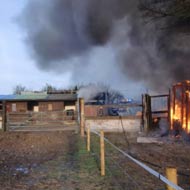Smoke inhalation 'a major veterinary challenge'

"Smoke is actually a bigger killer than burns and is a serious veterinary challenge".
Smoke inhalation in horses presents a major veterinary challenge, said the RVC's Professor Josh Slater during a recent conference on equine health and safety.
Owing to their natural reaction to fire, horses are particularly susceptible to rapid lung damage and even death from smoke inhalation.
Prof Slater, an expert in equine health and clinical studies, said: "Unlike humans, horses will automatically raise their heads during a fire to try and establish an escape route. This means that they are breathing in toxic smoke and super-heated gases which cause serious burn and chemical damage to the lungs and trachea.
"Smoke is actually a bigger killer than burns and is a serious veterinary challenge because, unlike burns, the effects of smoke inhalation are often not immediately apparent and we do not have specific treatments."
There is thought to be just a four-minute window from the start of the fire to the horse sustaining fatal smoke damage, Prof Slater added. Thus, it is essential for owners to have a clear fire prevention and evacuation plan, which is rehearsed regularly.
The discussions took place at the British Horse's Society's Safety Conference, which brought together horse keepers and safety industry experts.
According to insurance companies, horse health and safety is a multi-million pound industry that can sometimes be overlooked by owners. Last year, NFU Mutual paid more than £11 million for equine-related claims.
Many insurers in the sector are concerned that horse keepers are not fully aware of the impact a fire can have financially, as well as emotionally.
Nicki Whittaker, an equine insurance specialist at NFU Mutual, said during the event: "We would urge people to ensure they have the correct insurance, fire prevention measures and evacuation plan in place, so they are properly prepared if the worst happens."
For advice and information, horse keepers are advised to make contact with their local fire and rescue service.
Photo courtesy of Hampshire Fire and Rescue Service



 The Federation of Independent Veterinary Practices (FIVP) has announced a third season of its podcast, Practice Matters.
The Federation of Independent Veterinary Practices (FIVP) has announced a third season of its podcast, Practice Matters.